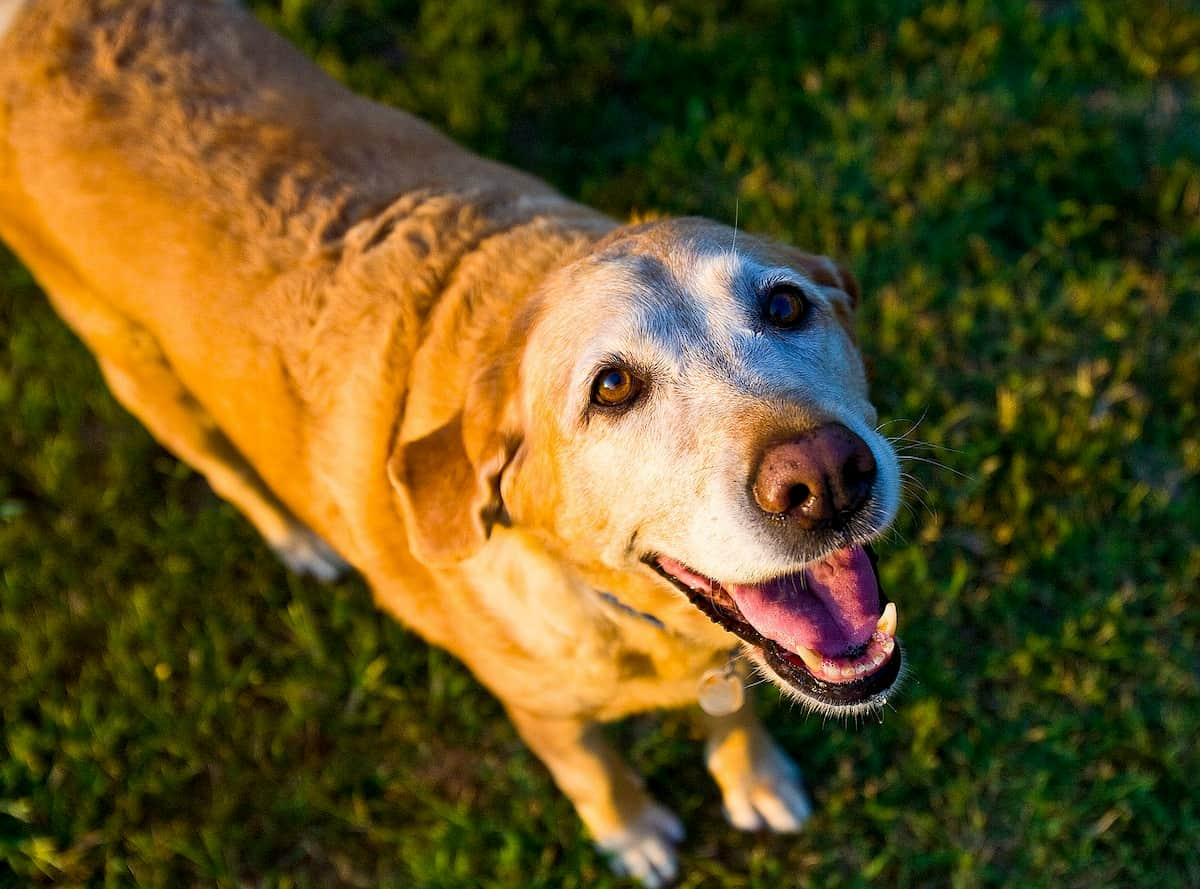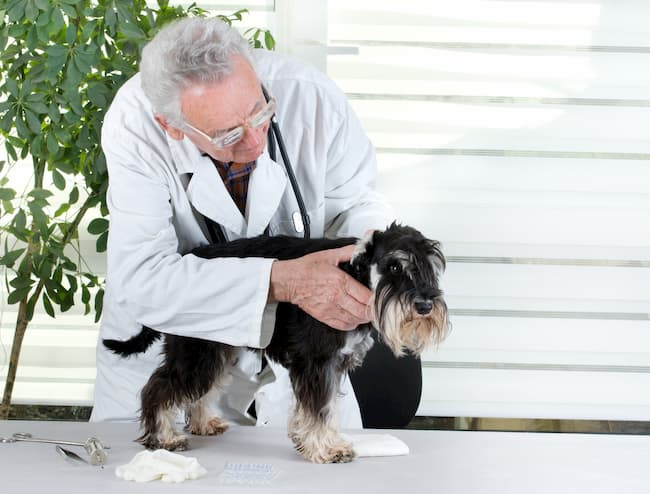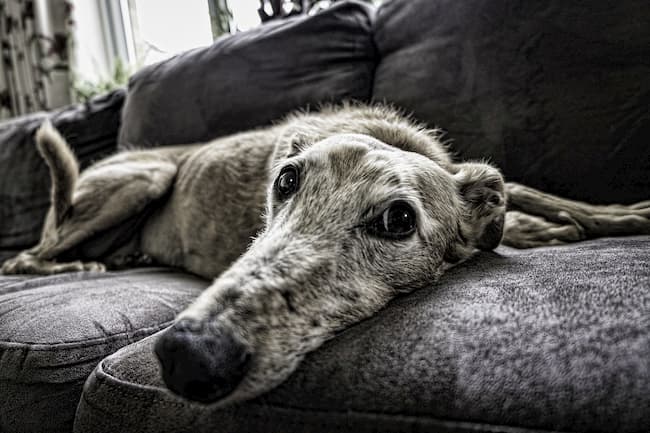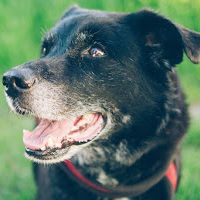FYI: If you buy something through a link on this site I may earn a commission - at NO extra cost to you.
Senior Dog Care
Good senior dog care doesn't have to be complicated and it can make a world of difference to how your dog lives out his golden years.
Just like humans, dogs experience certain changes and limitations as they age, it's just the nature of things.
However some simple adjustments to diet, exercise and daily routines, plus good veterinary care, can keep your dog happy, healthy and vigorous in his senior years.

Old Age In Dogs
So, how old do dogs live to be? And when are they considered to be seniors?
There are no one-size-fits-all answers to these questions but there are some general observations.
how old can dogs get?
Small breed dogs and large breed dogs have quite different lifespans.
If you were to compare a miniature breed to a giant breed, that difference would be staggering.
Tiny dogs routinely live for 15 years, some considerably longer. Giant breeds might expect to live for half that time.
So, how old was the world's oldest dog? The Guiness Book of Records have a cattle dog named Bluey who lived in Australia as the title holder. Bluey died in 1939 aged 29 years and 5 months old.
However in 2016 an Australian Kelpie (those Aussie dogs are hardy aren't they!) named Maggie passed away aged at 3o years of age.
Incredible.
This means that dogs reach maturity, adulthood, middle age, and old age, at different speeds depending on their size/breed. However, there is a rule-of-thumb that says the last quarter of a dogs life are his senior years.
A chihuahua might reach this senior milestone at around twelve years old, whereas a Great Dane may only be six.

But, don't panic, these are generalities and many large dogs live much longer than their average life expectancy. I've owned big dogs my whole life and two of my Rottweilers lived to be fifteen, that's pretty old for a Rottie. One of them acted like a much younger dog right up until the day she died of natural causes. How long a dog lives, and how much they are able to enjoy their entire lifetime depends on a variety of things including:
- Genetics
- Breed
- Upbringing
- Veterinary care over their lifetime
- Diet
- Exercise
- Lifestyle
and more.
As the above list shows, there are a lot of moving parts when it comes to giving Fido the best shot possible at a long, healthy and active life, and many of them start early. Some even before birth.
However there are also some very specific things that you can do to help your dog who is already in his senior years, whether he's experiencing any age-related health issues or not.
I'm going to cover these in an overview of the issues and areas involved in senior dog care on this page, and also link out from each section to individual pages which provide more in-depth information, tips and help.
Senior Dog Health
Older dogs have their own unique set of health problems. Of course, not all dogs will experience all, or even any, of them, but most senior dogs will need a little help to maintain optimum health.
The most common health issues that our old dogs face include:
- Arthritis
- Heart disease
- Weight issues
- Cognitive issues (similar to Alzheimers or dementia)
- Loss of eyesight or hearing
- Loss of appetite
- Dental problems
- Cancer
Sometimes these conditions can be mild, or develop slowly. Other times they appear more suddenly, or are severe.
Getting a veterinary evaluation of your dog when any issues begin to appear is very important because it's always easier, and less expensive, to treat a health problem earlier rather than later.

You know your dog better than anyone else does, so it is most likely to be you who notices a change in their appearance, behavior, abilities and so on. This can be worrying because we don't want to admit the dogs we love so much are getting older, but it's important not to turn a blind eye early on.
Most senior dog health problems are very treatable, and dogs can live many years comfortably and happily with the right veterinary care and a loving home to be in.
Check out my Senior Dog Health page to get the info. you need to manage and treat your old dog's health conditions.
don't forget about prevention....
Preventative measures to minimize the occurrence, or severity, of some senior dog health issues can be started while your dog is younger, and have the potential to add not just years to his life, but to also ensure those years are happier and more comfortable for him.
These include feeding a nutritious diet, setting up a healthy and appropriate exercise regime, maintaining a healthy weight and providing regular preventative veterinary care (in addition to taking care of health any problems that arise).
Feeding Senior Dogs
Many owners wonder what to feed their old dogs to keep them healthy and at an appropriate weight.
Senior dogs can be very picky about their food and an old dog that won't eat can be a real worry.
There are a variety of dog foods specifically designed for senior dogs and these may seem like a slam-dunk at first glance! However because all dogs age at a different speed, have differing activity levels and health conditions and may be overweight or underweight, there is definitely no one-size-fits-all formula.
There are no specific regulations that govern dog food marketed as a 'senior formula' so it's important to know what constitutes an healthy balance of nutrients for an older dog. Check out my Dog Food For Senior Dogs page for tons of information and tips on getting the nutritional balance right, supplementation and examples of some of the best commercial foods for old dogs.
Sometimes certain supplements can be really beneficial for Fido as he ages, but again, it depends on the individual dog and where or how he's getting those supplements.
Check out my What To Feed An Old Dog page to for loads of tips and information on feeding senior dogs.
Senior Dog Behavior
Behavior is a big indicator of your dog's health, but it can sometimes be tricky to figure out whether your senior dog is behaving in a specific way simply because he's aging, or whether he has a health condition that needs to be evaluated.

Common behavior changes seen in older dogs can include:
- Changes in mobility (eg moving more slowly, difficulty getting up etc.)
- Appetite changes (generally a decrease)
- Breathing changes (faster/slower or labored)
- Repetitive behaviors (pacing, circling, vocalizing etc.)
- Changes in bladder and bowel control (unpredictability or loss of)
- Weakness (shaking, collapse, disorientation etc.)
- Anxious behavior
You know your dog better than anyone else, and are the person most likely to notice changing behavior.
As with health issues, a behavioral change in a senior dog can happen slowly over a period of days, weeks, even months. Or it can happen seemingly overnight.
Any sudden change should always be evaluated by a veterinarian promptly in order to rule out an underlying health condition.
Visit my Old Dog Behavior page for lots more information.
you might also like...
- Home
- Senior Dog Care
FTC Disclosure: Some pages on this site contain affiliate links. I may earn on qualified purchases.





